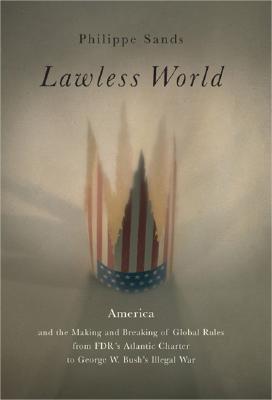

| LAWLESS WORLD America and the Making and Breaking of Global Rules from FDR's Atlantic Charter to George W. Bush's Illegal War Philippe Sands New York: Viking Books, October 2005 |
Rating: 5.0 High |
|||
| ISBN-13 978-0-670-03452-9 | ||||
| ISBN-10 0-670-03452-5 | 324pp. | HC | $25.95 | |
Invited to speak before some of Tehran's finest law students in the summer of 1999, the author of this book1 found them favorably disposed toward his country's legal opinion regarding a foreign former head of state and respectful of, even passionate about, the importance of international law as a regulator of the conduct of nations.
This attitude contrasted starkly with his presupposition that the Iranian graduate students would look at Britain's decision stripping the former president of Chile of sovereign immunity as typical overweening imperialism on the part of the developed world. It also stands in stark contrast to America's attitude — and more importantly its behavior — during the administration of George W. Bush. This administration has refused to commit to international agreements most other nations embraced, such as the Rome Statute of the International Criminal Court, and it has withdrawn from treaties the U.S. has long upheld.
There is a historical irony in America's current abnegation of commitment to internationally agreed norms of behavior. For it was America, joining with Britain in the aftermath of World War 2, who promulgated the Atlantic Charter and subsequently led the world in drafting and adopting guarantees of civilized behavior. It is no accident that the Charter of the United Nations was signed in San Francisco, or that New York City houses UN headquarters. The current administration appears dedicated to reversing that stance, to charting an independent course for the U.S. Such a course was proclaimed by the neoconservative Project for a New American Century during the 1990s. It was given impetus (or, depending on your level of cynicism, gifted with a handy excuse) by the terrorist attacks of 9/11. The Bush administration wasted no time in adopting an "anything goes" policy in the war on terror. So we have seen prisoners taken in that war labeled "unlawful combatants" to absolve America from responsibility to treat them according to the terms of the Geneva Conventions. Housing them on foreign soil at Guantánamo was another attempt2 at technical evasion of the Conventions. We have seen some of the pictures taken by U.S. service members at Abu Ghraib, demonstrating beyond doubt that torture was used to extract information from the detainees there, and documents uncovered by Seymour Hersh and other reporters prove that this was no aberration but a result of policy justified at high levels. Indeed, we now know that a great deal of effort was expended by administration legal staff to concoct exemptions for the U.S. from norms of behavior such as the 1984 Convention against Torture.
Philippe Sands dissects those claims of exemption in this book. Drawing on the texts themselves as well as his wide experience in the field of international law, he reveals how threadbare they are — and how counterproductive in the long run is the attempt to go it alone. He examines not only the treatment of prisoners in the "war on terror" and the justification of the invasion of Iraq, but America's rejection of the Kyoto Accords and the jurisdiction of the International Criminal Court, its blocking of measures that would strengthen the Nonproliferation Treaty, and its participation in economic agreements like NAFTA. While some short-term gains may be achieved by these means, in the long run they will cost America much of its moral standing and the good will that accrues to it from those values. There will be practical costs as well, when adversary nations turn the precedents the U.S. established against it, by refusing to extradite offenders for trial in the U.S., or by taking preemptive military actions.
Lawless World is a closely reasoned scholarly work, exhaustively researched and extensively footnoted. It is definitely not an easy read. Yet it is worth reading for its British perspective on recent American politics (and on British politics too, for Tony Blair does not escape harsh treatment) and for its illumination of the fact that, for all their complexity and difficulty, the frameworks and conventions of international law are vital parts of Twenty-First Century civilization. Sands' writing is clear, for the most part, enlivened with his passion for the subject; and he makes few errors. The book is well indexed. It provides extensive chapter notes, which frequently quote relevant passages from speeches or news stories. Nine appendices contain extracts from some of the most important documents, beginning with the Atlantic Charter. I wouldn't go quite so far as to recommend this as a reference work on international law (though it comes close.) But it certainly deserves to be read by anyone seeking a better understanding of that complex and evolving arena.

 To contact Chris Winter, send email to this address.
To contact Chris Winter, send email to this address.